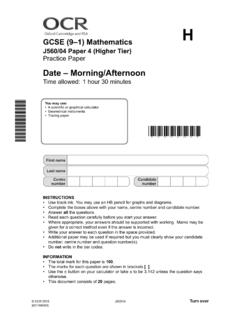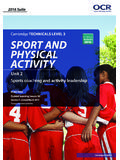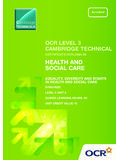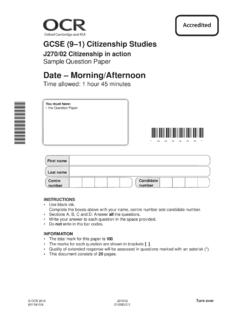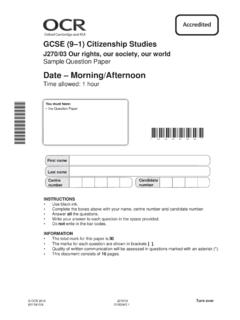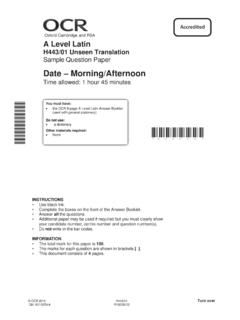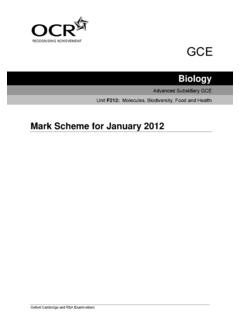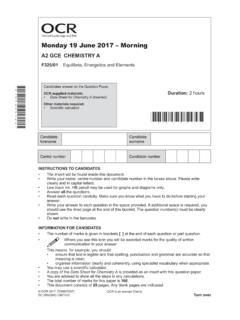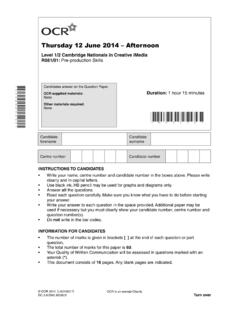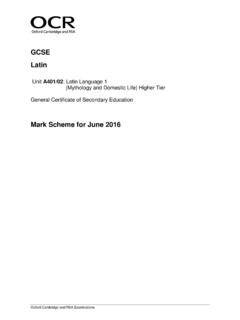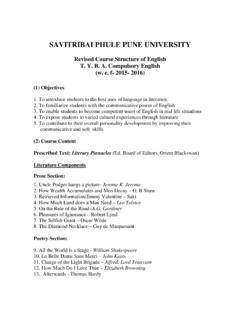Transcription of AS and A Level English Language Guide to Theorists
1 AS and A LEVELENGLISH LANGUAGEH070/H470 For first teaching in to TheoristsVersion 1 Guide to Theorists2AS and A Level English Language OCR 2017 Guide to TheoristsThis Guide signposts towards key Theorists whose work may be helpful for students to explore as part of the AS/ A Level English Language course. Please note that this Guide is not exhaustive or prescriptive and schools may also want to look at Theorists and theories not mentioned here. This resource can be used in conjunction with OCR s Glossary of Terms and Main Language Theories : to Theorists3AS and A Level English Language OCR 2017 GlossaryGlossary of Terms and Main Language Theories reviewed in AS and A Level English Language specificationAAitchison, Jean labelling/packaging/network building explored lexical acquisition and patterns/relationships (CLA)BBaker, Paul construction of sexuality and gender through languageBarthes, R semiotics, construction of meaning relationship between reader and writer.
2 Signifier and signifiedBeattie, Geoffrey significance of interruptions (gender)Berko, Jean Wug test, morphology, (CLA)Bernstein, Basil restricted vs elaborated code; links between Language and social classBrown, Penelope pragmatics, face, politeness principle (with Levinson)Brown, Roger syntax, morphology in relation to CLAB runer, Jerome emphasis on the social environment of children in supporting linguistic development (CLA)CCameron, Deborah gender interaction challenges difference and deficit modelsCheshire, Jennifer non-grammatical forms, peer groups, dialectChomsky, Noam nativism/inbuilt capacity to develop speech programmed into the human brain universal grammar (CLA)
3 Coates, Jennifer gender, oral culture, house talkCoulthard, M discourse analysis; classroom discourse IRF (Initiation-Response-Follow-up model (with Sinclair)Crystal, David descriptivist/very influential contemporary linguistDDrew and Heritage occupational dialect; goal orientation; asymmetry; allowable contributionsDyer, Gillian advertising; representationGuide to Theorists4AS and A Level English Language OCR 2017 Glossary of Terms and Main Language Theories reviewed in AS and A Level English Language specificationEEckert, Penelope sociolinguistics, Language and genderFFairclough, Norman instrumental/influential power synthetic personalisationFox, Sue MLE; historical sociolinguisticsGGiles, Howard accommodation theory; convergence; divergenceGithens, Susan gender styles; computer mediated communicationGoffman, Irving linguistic interaction.)
4 FaceGrice, H P conversation theory; cooperative principle conversational maximsHHalliday, Michael ideational metafunction; representation functions of Language ; children develop Language because it serves specific purposes/functions for themHolmes, Janet occupational dialect; small talk, compliments linguistic behaviourGuide to Theorists5AS and A Level English Language OCR 2017 KKerswill, Paul dialect levelling; Language changeKoester, Almut importance of phatic talk in occupational dialectLLabov, William sociolinguistics, phonology, dialect and accent levellingLakoff, Robin dominance/deficit model (gender)Leech, Geoffrey pragmatics, politeness, stylistics, grammarLenneberg, Eric proposed the idea of the critical period (up to approximately five years of age) Language acquisition becomes much harder if this has passed.
5 (CLA)Levinson, Steven pragmatics, face, politeness principle (with Brown)MMilroy, Lesley speech communities; closed and open networksOO Barr, W and Atkins, B social status; context; gender; powerless Language courtroom discourseGuide to Theorists6AS and A Level English Language OCR 2017 Glossary of Terms and Main Language Theories reviewed in AS and A Level English Language specificationPPiaget, Jean cognitive development and its role in Language acquisition LASS ( Language Acquisition Support System) Role of caregivers in fostering Language development, eg through providing scaffolding Pinker, Steven Language acquisition, focusing particularly on syntax, grammatical structures, semanticsSSapir-Whorf hypothesis advanced by Edward Sapir, later developed by Benjamin Whorf explores impact of a Language s structure on perception linguistic relativity, determinismSebba, Mark Identity, bilingualism London Jamaican, creoles, pidginsSinclair, J discourse analysis.
6 Classroom discourse IRF (Initiation-Response-Follow-up model (with Coulthard)Skinner, B F behaviourism, believed children learned by copying parents speech and through positive reinforcement (CLA)Spender, Dale genderlect; dominance; Language as embedding and strengthening patriarchal values and structuresSwales, John Discourse community; the Language of shared goalsTTannen, Deborah difference model of gendered Language identifies a range of differences between male and female speech, for example focuses on concepts of status vs supportTomasello, Michael Construction model of Language acquisition; usage-based approachTrudgill, Peter research into Language , class and gender.)
7 Saw women s speech as more socially aspirational dialect levellingVVygotsky, Lev zone of proximal development - difference between the ability to perform tasks with and without guidance (CLA)WWareing, Sh n types of power; Language , society, genderZZimmerman, Don and West, Candace gender; dominance model; interruptionWe d like to know your view on the resources we produce. By clicking on the Like or Dislike button you can help us to ensure that our resources work for you. When the email template pops up please add additional comments if you wish and then just click Send.
8 Thank you already offer OCR qualifications, are new to OCR, or are considering switching from your current provider/awarding organisation, you can request more information by completing the Expression of Interest form which can be found here: Resources: the small printOCR s resources are provided to support the delivery of OCR qualifications, but in no way constitute an endorsed teaching method that is required by OCR. Whilst every effort is made to ensure the accuracy of the content, OCR cannot be held responsible for any errors or omissions within these resources.
9 We update our resources on a regular basis, so please check the OCR website to ensure you have the most up to date resource may be freely copied and distributed, as long as the OCR logo and this small print remain intact and OCR is acknowledged as the originator of this work. OCR acknowledges the use of the following content: Page 2: Woman typing - , Page 4: Man reading - , Page 5: Young girl typing - Angela , Page 7: Square down and Square up - get in touch if you want to discuss the accessibility of resources we offer to support delivery of our qualifications: is part of Cambridge Assessment, a department of the University of Cambridge.
10 For staff training purposes and as part of our quality assurance programme your call may be recorded or monitored. OCR 2017 Oxford Cambridge and RSA Examinations is a Company Limited by Guarantee. Registered in England. Registered office 1 Hills Road, Cambridge CB1 2EU. Registered company number 3484466. OCR is an exempt qualificationsTelephone 01223 553998 Facsimile 01223 552627 Email Customer Contact CentreLooking for a resource?There is now a quick and easy search tool to help find free resources for your small print
